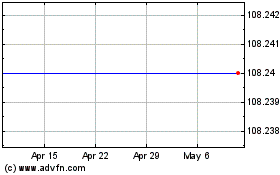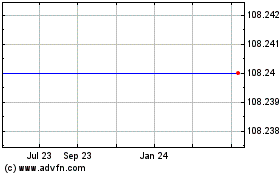Biotech Billionaire Is Sued Over Deal For Cancer Drug -- WSJ
April 04 2019 - 2:02AM
Dow Jones News
By Jared S. Hopkins
This article is being republished as part of our daily
reproduction of WSJ.com articles that also appeared in the U.S.
print edition of The Wall Street Journal (April 4, 2019).
Sorrento Therapeutics Inc. alleges billionaire Patrick
Soon-Shiong and one of his companies stopped development of an
experimental cancer drug because its success would hurt sales of a
rival drug sold by Celgene Corp. that Dr. Soon-Shiong invented,
according to a civil complaint filed in Los Angeles Superior
Court.
Sorrento sold the cancer drug Cynviloq to Dr. Soon-Shiong's
NantPharma LLC in a deal valued at up to $1.3 billion in 2015.
Sorrento received more than $90 million in cash, with the remaining
funds tied to regulatory and sales milestones if the drug received
regulatory approval.
The complaint, filed Wednesday, says that Dr. Soon-Shiong
promised Sorrento that he would ensure Cynviloq was approved and
launched in the U.S. Instead, he and his companies stopped
development in what the complaint termed a "catch and kill" scheme
because Cynviloq's success would have hurt sales of the drug he
invented, Abraxane. Dr. Soon-Shiong had sold Abraxane and its
manufacturer, Abraxis BioScience Inc., to Celgene for $2.9 billion
in 2010. First approved by U.S. regulators in 2005 to treat breast
cancer, Abraxane sold over $1 billion last year.
When he sold, Abraxis, Dr. Soon-Shiong received a 2% stake in
Celgene. Like other Abraxis shareholders, he also received tradable
contingent value rights tied to future Abraxane sales. Celgene also
has invested in Dr. Soon-Shiong's businesses. Last year it
increased its total in one of his companies called NantCell to $105
million. Celgene has agreed to be acquired by rival Bristol-Myers
Squibb for $74 billion.
In a statement, Dr. Soon-Shiong said the lawsuit lacked merit
and is an attempt by Sorrento to deflect from Sorrento's own
violation of an agreement with Dr. Soon-Shiong and his company,
including failing to provide drug candidates. He also said that
Sorrento misrepresented Cynviloq's scientific data and as a result
he and his company are retesting the drug in clinical studies.
A Celgene spokesman declined to comment on the lawsuit.
The biotechnology entrepreneur is worth more than $7 billion,
according to Forbes. Born and raised in South Africa, Dr.
Soon-Shiong arrived in the U.S. in the 1980s and was a surgeon at
the University of California, Los Angeles.
His profile has grown in recent years and last year, he acquired
the Los Angeles Times from Tribune Publishing Co. for $500 million.
He also owns a significant chunk of the Los Angeles Lakers
basketball team.
Dr. Soon-Shiong's biotech interests have been challenged before
in court. In 2017, pop star Cher alleged she was duped into selling
her shares in Altor BioScience Corp to Dr. Soon-Shiong at a
fraction of their real value. Records show a judge dismissed the
case at Cher's request in 2018.
The Sorrento suit alleges that Dr. Soon-Shiong initially
suggested facilitating a deal in which Celgene would acquire
Cynviloq. But in early 2015, Celgene's lawyers determined U.S.
authorities would likely prohibit it on antitrust grounds,
according to the complaint. Then Dr. Soon-Shiong told Sorrento's
chief executive that his own experience with Abraxane made him the
right person to ensure Cynviloq reached patients, according to the
complaint.
The companies announced their deal in May 2015. The companies
also made a joint venture for research and development in which
Sorrento invested $40 million, and an entity related to Dr.
Soon-Shiong would contribute $60 million.
Dr. Soon-Shiong agreed with Sorrento's decision to plan to file
for U.S. approval in late 2015 with a launch expected a year later,
according to the complaint. In early 2015, Sorrento had announced
promising clinical-trial data on the drug.
The application was never filed and a key patent for Cynviloq
expired, according to the complaint. Instead, Dr. Soon-Shiong
allegedly had the joint venture in 2017 buy Cynviloq from
NantPharma for $90 million. Those funds included the money Sorrento
had invested in the venture, the complaint says.
"It wasn't until months later, when trying to close their
year-end books, that Sorrento learned of the secret scheme and the
significant loss of capital," according to the complaint.
In the past, promising drugs from other companies have suffered
due to changing commercial interests. For example, Napo
Pharmaceuticals Inc. sued Salix Pharmaceuticals Ltd., now part of
Bausch Health Cos., alleging that Salix breached an agreement to
help develop a diarrhea drug because Salix had a competing
treatment. The companies settled and the drug's rights were
returned to Napo.
Write to Jared S. Hopkins at jared.hopkins@wsj.com
(END) Dow Jones Newswires
April 04, 2019 02:47 ET (06:47 GMT)
Copyright (c) 2019 Dow Jones & Company, Inc.
Celgene (NASDAQ:CELG)
Historical Stock Chart
From Mar 2024 to Apr 2024

Celgene (NASDAQ:CELG)
Historical Stock Chart
From Apr 2023 to Apr 2024
